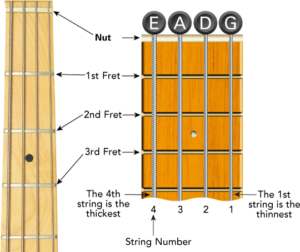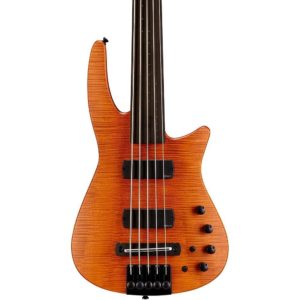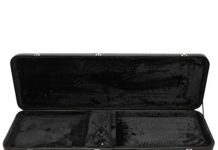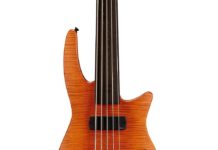If you are a bass guitar player, you are no doubt familiar with the many different types of bass guitars available in the market. Among the many types of bass guitars are fretted and fretless bass guitars, but many people are unsure about the differences between a fretless bass guitar and a regular, fretted bass guitar. We’ll cover the differences and benefits of both below.
What are the differences between Fretted and Fretless Bass Guitars?
The greatest difference between a fretted and fretless guitar is the presence, or absence, of a fret. Simply defined, a fret is a piece metal that is entrenched along the fretboard of a guitar. The primary function of frets is to guide players to the correct notes as they play the bass guitar. When one touches the strings between frets, it changes the length of the guitar string, and this in turn changes the notes of the song being played.

It is easy to infer that a fretted bass guitar is one that has frets while a fretless bass guitar lacks frets. Musically speaking, what does this mean? Well, one difference that arises from the presence or absence of frets is the smoothness of transitioning from one note to another. With a fretless bass guitar, it is much easier to transition from note to another. With a fretless bass guitar, you can actually shape the notes yourself. This is why fretless bass guitars are the most popular type among jazz players who frequently slide on the strings.
Fretless bass guitars also don’t produce the hard notes that are characteristic of rock music, but have a rather wide array of soft notes. Additionally, fretless bass guitars are far quieter than fretted guitars. Fretless guitars are also harder to come by than fretted ones.
Keep in mind that it is also harder to play fretless bass guitars than it is to play fretted ones. Frets help guide musicians to the proper note. If you are playing a fretless guitar therefore, you have to rely on your own skill, which can be somewhat difficult. That being said however, there are various advantages of playing a fretless bass guitar over playing a fretted one and traditional orchestra instruments have played fretless instruments for centuries.
Benefits of Playing Fretless Bass Guitars
1. More Freedom
The absence of frets on a fretless bass means that players are not restricted only to the Western Standard sound range. This gives them freedom to explore all the sound ranges that fall in between the traditional notes. It gives them room to explore their creativity and discover new sounds that are unique.
2. Better your skill
Playing a fretless bass requires a high level of skill on the part of the player. Players have to rely on their own listening skills and technique to play the instrument correctly. While some view this as an unnecessarily difficult, it actually is an opportunity for ardent players to perfect their bass guitar-playing skills. It might require long hours of practice before you start playing perfect music, but when you eventually excel in playing the fretless bass, you will feel an incomparable sense of accomplishment. Few things are as rewarding as learning how to play a fretless bass well.
3. More Fluidity
The absence of frets on a fretless bass means that you can transition more smoothly from one note to another. Music played on these guitars is warm, soft, and smooth. This is because there are no abrupt stops as you change pitches, which allows the sound to flow smoothly. This sound is more pleasant to the ears as well.
How to Play a Fretless Bass
1. Start with a Fretted Bass Guitar
As already pointed out, playing a fretless bass guitar is rather difficult. It can be as frustrating as it is rewarding. For this reason, you should learn with a fretted bass first. The frets will guide you as you learn to play the instrument and learn what the notes sound like. As you become better at playing the fretted bass guitar, you can then try your hand in the fretless one. Alternatively, you can start with a fretless bass that has lines where the frets would have been. These can act as guidelines as you get more familiar with the instrument, and you can always erase them or change the neck of the guitar when you no longer need them.
2. Learn to Slide
One of the core skills that every fretless bass guitar player must master well is that of sliding from one note to another on the strings. Initially, this can be somewhat difficult, but with practice, you will become better at it. To improve your sliding skills, you will have to perfect your left-hand technique. Your hand position also matters, and you also need to spread your fingers out well. Ideally, you should have each finger placed on a fret in order to produce the right notes.
3. Play on the Lines
Unlike a fretted bass guitar where you place your fingers behind the lines, you should place your fingers on the lines with a fretless bass. If you fail to do this, your notes will be off, and this can be annoying. This is the cardinal rule of playing a fretless bass guitar.
4. Use a Tuner
To ensure that you do not stray too far from the correct notes, you will need a tuner. You will use the tuner to check the notes as you play them to make sure that they are in tune. It is not enough to practice a lot; you must ensure that you practice perfectly.
5. Use Higher Amplification
With a fretless bass you will need to use higher amplification than you ordinarily would with a fretted bass guitar. Do not worry if the volume is lower than you are used to: it is characteristic of fretless bass guitars, so you have to turn up the volume on the amp.
6. Don’t Be Anxious
If you are not perfect the first time you start playing the instrument, give yourself time. You may overlook this, but anxiety could be holding you back from perfecting your skill. So if you go out of tune a couple of times as you familiarize yourself with the instrument, know that it is completely acceptable.
Our Favorite Fretless Bass Guitars
Fender Jaco Pastorius Jazz Fretless Bass Guitar
NS Designs NS CR5-BG-AMS-FL Fretless Bass Guitar
Conclusion
Playing a fretless bass guitar perfectly is a skill worth bragging about. It may take a lot of time to master the instrument, but it will be well worth it. As a matter of precaution, use flat wound strings instead of round wounds. This is because the round ones can scratch your instrument, damaging it badly. If you experience difficulties the first few times you play the instrument, do not get discouraged. With time, you will become a master at playing it. It is a great challenge especially for you who simply want something more exciting than a fretted bass guitar.
Table of Contents





